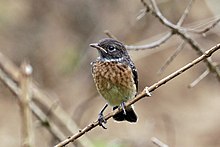The Madagascar stonechat (Saxicola sibilla) is a species of stonechat, endemic to Madagascar. It is a small bird, closely similar to the African stonechat in both plumage and behaviour, but distinguished from it by the more extensive black on the throat and minimal orange-red on the upper breast of the males.[1]
| Madagascar stonechat | |
|---|---|

| |
| Male | |

| |
| Female both near Andasibe | |
| Scientific classification | |
| Domain: | Eukaryota |
| Kingdom: | Animalia |
| Phylum: | Chordata |
| Class: | Aves |
| Order: | Passeriformes |
| Family: | Muscicapidae |
| Genus: | Saxicola |
| Species: | S. sibilla
|
| Binomial name | |
| Saxicola sibilla (Linnaeus, 1766)
| |
| Synonyms | |
| |
Taxonomy
editIn 1760 the French zoologist Mathurin Jacques Brisson included a description of the Madagascar stonechat in his Ornithologie based on a specimen collected in Madagascar. He used the French name Le traquet de Madagascar and the Latin Rubetra Madagascariensis.[2] Although Brisson coined Latin names, these do not conform to the binomial system and are not recognized by the International Commission on Zoological Nomenclature.[3] When, in 1766, the Swedish naturalist Carl Linnaeus updated his Systema Naturae for the twelfth edition, he added 240 species that had been previously described by Brisson.[3] One of these was the Madagascar stonechat. Linnaeus included a brief description, coined the binomial name Motacilla sibilla, and cited Brisson's work.[4] The specific name sibilla is from the Latin sibilare "to whistle".[5] This species is now placed in the genus Saxicola , which was introduced by the German naturalist Johann Matthäus Bechstein in 1802.[6]
The Madagascar stonechat has generally been considered a subspecies of African stonechat (as Saxicola torquatus sibilla[1]), but recent genetic evidence has shown that it is distinct, more closely related to Reunion stonechat than it is to African stonechat,[7] on which basis it is now accepted as a distinct species. Three subspecies are recognised.[8]
References
edit- ^ a b Urquhart, E., & Bowley, A. (2002): Stonechats. A Guide to the Genus Saxicola. Christopher Helm, London. ISBN 0-7136-6024-4
- ^ Brisson, Mathurin Jacques (1760). Ornithologie, ou, Méthode contenant la division des oiseaux en ordres, sections, genres, especes & leurs variétés (in French and Latin). Vol. 3. Paris: Jean-Baptiste Bauche. pp. 439–440, Plate 24 fig 4. The two stars (**) at the start of the section indicates that Brisson based his description on the examination of a specimen.
- ^ a b Allen, J.A. (1910). "Collation of Brisson's genera of birds with those of Linnaeus". Bulletin of the American Museum of Natural History. 28: 317–335. hdl:2246/678.
- ^ Linnaeus, Carl (1766). Systema naturae : per regna tria natura, secundum classes, ordines, genera, species, cum characteribus, differentiis, synonymis, locis (in Latin). Vol. 1, Part 1 (12th ed.). Holmiae (Stockholm): Laurentii Salvii. p. 337.
- ^ Jobling, J.A. (2018). del Hoyo, J.; Elliott, A.; Sargatal, J.; Christie, D.A.; de Juana, E. (eds.). "Key to Scientific Names in Ornithology". Handbook of the Birds of the World Alive. Lynx Edicions. Retrieved 10 May 2018.
- ^ Bechstein, Johann Matthäus (1802). Ornithologisches Taschenbuch von und für Deutschland, oder, Kurze Beschreibung aller Vögel Deutschlands für Liebhaber dieses Theils der Naturgeschichte (in German). Leipzig: Carl Friedrich Enoch Richter. p. 216.
- ^ Woog, F.; Wink, M.; Rastegar-Pouyani, E.; Gonzalez, J.; Helm, B. (2008). "Distinct taxonomic position of the Madagascar stonechat (Saxicola torquatus sibilla) revealed by nucleotide sequences of mitochondrial DNA". Journal of Ornithology. 149 (3): 423–430. Bibcode:2008JOrni.149..423W. doi:10.1007/s10336-008-0290-1.
- ^ Gill, Frank; Donsker, David, eds. (2018). "Chats, Old World flycatchers". World Bird List Version 8.1. International Ornithologists' Union. Retrieved 10 May 2018.
External links
edit